
“Britain’s departure had been accomplished with dignity.” My first question about The Last Governor, Jonathan Dimbleby’s 1997 account of the five years of Chris Patten’s governorship of Hong Kong, which ended with Britain’s handover of Hong Kong to China in 1997, is: What does Dimbleby mean by this statement (made on p. xiii of the Warner Books edition of the book)? To which person or persons is Dimbleby referring?
The first and most obvious candidate is Chris Patten himself, who “After a turbulent five years,” was to leave his post “garlanded in accolades.” But even the brief foreword of the book notes certain severe lacks of dignity marking the long process of Britain’s withdrawal, which was not a one-man endeavor.
Harsh controversy
Patten’s tenure and assessments of British policy toward Hong Kong were controversial. The policy itself was controversial. “The matters which have given rise to the strongest debate” pertained to “the conduct of British foreign policy on Hong Kong in the years leading up to Patten’s appointment in 1992,” “the battles between Whitehall and Patten during his tenure,” and Patten’s “outspoken observations about his adversaries” in Beijing, Hong Kong, and London.
According to columnist Simon Jenkins, if Patten’s “allegations against British ministers and officials” are true, their conduct amounts to treason.
On the other hand, Sir Percy Cradock, “the architect of British policy until 1992 and Patten’s most venomous critic, insisted that the ‘grotesque’ charges of ‘dishonourable conduct’ against him and others ‘would not bear serious examination.’ ”
Former foreign secretary Lord Howe regarded Patten’s accusations as “surreal and unjust” and called chronicler Dimbleby an “ ‘Iago-like’ accomplice.” Iago is one of the most malicious (and most self-consciously malicious) characters in Shakespeare.
The Foreign Office also reportedly launched an inquiry into whether Dimbleby “had been in receipt of ‘secret intelligence material’ from Chris Patten.” Although the legitimacy of this suggestion was doubted, “the security services were, it seems, instructed to investigate—though the forensic intensity of their inquiries may be gauged from the fact that they apparently did not deem it necessary to seek an interview with either Patten or the author.” The matter was soon dropped.
Fear of China
The wider controversy did not fade so fast.
One of the principal themes that runs through The Last Governor is the view, pervasive in Hong Kong, that successive British governments frustrated the colony’s demand for democracy because they were overly fearful of China’s reaction. It is this interpretation of the events in which, for a time, they were key participants that so rankles with Sir Percy Cradock, Lord Howe and their acolytes. Contemptuous of anyone who fails to view Hong Kong from their own perspective, they display hurt feelings but fail to offer a convincing rebuttal of the case against them.
The substance of this case is not that British officials acted treasonably or treacherously (though many people in Hong Kong do believe themselves to have been betrayed), but that their priorities were woefully misplaced, and that, as a result, they not only underplayed Britain’s hand in their dealings with China, but, as I argue, at a key period in this tortured history—between 1986 and 1987—they knowingly subverted the will of the people of Hong Kong in collusion with China. They rage at that analysis (I suspect) because, in the absence of clear evidence to the contrary, they emerge from this episode less as statesmen than as diplomatic wheeler-dealers preferring almost any agreement to none.
Fear of China’s reactions continues to be a familiar motive on the world stage, and willingness to accept “almost any agreement to none” a familiar modus operandi.
In this foreword, written after publication of the first edition of The Last Governor, Dimbleby modifies some judgments, acknowledges certain omissions (such as failure to report former Prime Minister Margaret Thatcher’s consistent strong support for Patten), and corrects a few errors of fact. In general, though, Dimbleby regards his account as fair and accurate.
One of his errors was pointed out by Lord Howe, who “quite properly took me to task for incorrectly placing him on the board of GEC, which invests heavily in China. I regret my error. I should have written (though he did not take the opportunity to point this out himself) that he was a consultant to the board of Cable and Wireless, which similarly invests heavily in China.”






